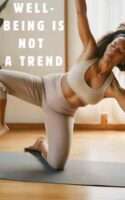We frequently hear, “What’s the latest well-being trend?” The ‘trend’ definition of well-being implies a temporary movement that may wander due to external causes or swing along an uneven route.
Well-being is feeling positive emotions like happiness and contentment, developing one’s potential, having some control over one’s life, having a sense of purpose in life, and having positive relationships.
It is critical to prioritise well-being.
Assessing our well-being can help us discover gaps in our lives. These gaps can assist us in determining where further work may be required.
We should shift the focus from fads or what’s trendy to finding a committed way of living in which well-being is a fundamental aspect of human existence.
Well-being is a process rather than a “trend.”
Mandy (27): “Well-being goes beyond meditation and yoga. For me, well-being is a long restorative process of listening to yourself.”
There has been a proliferation of health apps that inquire about our digital approach or seek clarification on how we’ll incorporate Al into daily lives for better well-being.
Whenever someone tries to transform even a tiny portion of what humans need to do or need for daily life into a digital intervention, I have such an adverse reaction. Apps are tools which can be incredibly harmful when misused. No software can replace the experience of spending time in a place designed to enhance well-being.
For instance, an app cannot replicate a sauna, a dip in a chilly pool, healing hands, and the profound connection of genuine people. Unfortunately, or fortunately, being in nature is not equal to anything simulated in an app.
Jacky (24): “Well-being apps can never truly articulate what being in tune with oneself is.”
The intricate interactions within natural environments provide far too nuanced benefits to be condensed into an app. Additionally, nutritious food, a critical component of well-being, cannot be reconstructed by an app. The field of nutrition is highly specialised and incredibly diverse, and the sensory experiences and nutritional benefits of real food are irreplaceable.
The reality is that we have a minimal understanding of how anything functions, and it is sad that we believe we can condense any aspect of the human experience into an app. We humans still passionately disagree about whether the Earth is round or flat.
These very uncertainties highlight my point.
While technology can offer valuable tools, it cannot substitute for profound experiences and connections. We can ensure a more fulfilling and balanced existence by shifting our focus from temporary wellness trends to a committed, lifelong approach to well-being.
Embracing this perspective allows us to prioritise well-being as an essential aspect of human life rather than just another trend to follow.
How would you advise someone who wants to prioritise lasting well-being in their daily life amidst the allure of digital solutions?



